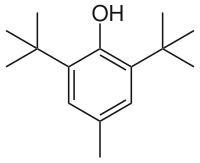
Photo from wikipedia
Abstract Pericarp browning is known as one of the leading problems during the supply chains of litchi fruit. The effects of pre-storage kojic acid (KA) application on pericarp browning, activities… Click to show full abstract
Abstract Pericarp browning is known as one of the leading problems during the supply chains of litchi fruit. The effects of pre-storage kojic acid (KA) application on pericarp browning, activities of antioxidative enzymes in the pericarp tissues, and the quality attributes, soluble solid concentrations, titratable acidity and ascorbic acid concentrations of the flesh of ‘Gola’ litchis have been investigated. Fruit were treated with 2, 4 or 6 mmol L−1 KA and stored at 5 ± 1 °C with 90 ± 5% relative humidity for 20 d. Fruit treated with 4 mmol L−1 KA had reduced fruit weight loss and fruit decay; while, 6 mmol L−1 KA delayed pericarp browning by maintaining higher total anthocyanin and phenolic concentrations, and 2, 2-diphenyl-1-picrylhydrazyl (DPPH) radical scavenging activity. Reduced malondialdehyde, and hydrogen peroxide concentrations, and activities of oxidative enzymes such as peroxidase and polyphenol oxidase were also observed in 6 mmol L−1 KA-treated fruit. In contrast, activities of ascorbate peroxidase, catalase and superoxide dismutase enzymes were found to be higher in pericarp tissues of fruit subjected to 6 mmol L−1 KA application. Moreover, soluble solid concentrations, titratable acidity, ascorbic acid concentrations and sensory characteristics were also higher in 6 mmol L−1 KA-treated litchi fruit. In conclusion, pre-storage application of 6 mmol L−1 KA to litchi fruit delayed pericarp browning and maintained activities of antioxidative enzymes.
Journal Title: Postharvest Biology and Technology
Year Published: 2017
Link to full text (if available)
Share on Social Media: Sign Up to like & get
recommendations!